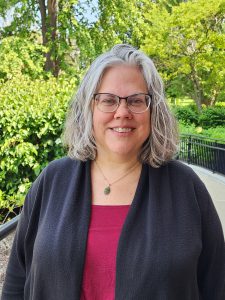Michelle Snyder ’09 is a church consultant and a national leader in suicide prevention training for faith communities. In this post, she shares about her journey from “ministering” to the point of self-neglect to finding theological grounding and healing that enabled her to serve others with energy, joy, and unimaginable impact in faith communities around the country.
Choosing Formation Over Burnout
 “When I first came to PTS, I was a ‘theological train wreck,’” Michelle says. “I was a victim of toxic theology and bad formation, and I was destroying myself trying to live that theology out.” Michelle describes that she was giving her life to homeless ministry in New York City, but was doing so in a way that did not make space for her own wellness. For example, she rented an apartment, but she’d usually sleep on the floor by the door so that someone else could have her bed. “My tradition had taught me a lot of Bible,” she says, “but I didn’t have the emotional, spiritual, or intellectual infrastructure to manage theological complexity. I felt the whole world was on my shoulders.”
“When I first came to PTS, I was a ‘theological train wreck,’” Michelle says. “I was a victim of toxic theology and bad formation, and I was destroying myself trying to live that theology out.” Michelle describes that she was giving her life to homeless ministry in New York City, but was doing so in a way that did not make space for her own wellness. For example, she rented an apartment, but she’d usually sleep on the floor by the door so that someone else could have her bed. “My tradition had taught me a lot of Bible,” she says, “but I didn’t have the emotional, spiritual, or intellectual infrastructure to manage theological complexity. I felt the whole world was on my shoulders.”
Finally, a friend encouraged Michelle to take care of herself before she burned out. “Before you try to save anyone else, why not take time for yourself?” That friend was a student of the Rev. Dr. Andrew Purves, a former theology professor at PTS. So, Michelle decided to enroll in the Seminary as a master’s student.
 “The first thing I experienced at PTS was Dr. Martha Robbins’ spiritual formation class,” Michelle says. “At first, I couldn’t read the Bible without crying, and I discovered that the Bible was actually a trigger for me. I would cry in class every day.” Her professor recommended an on-campus therapist, and this became a turning point in Michelle’s life. “I finally got the mental healing I needed,” she says, “and at the same time, I found spiritual grounding and framing through my other classes. Seminary provided first a safe place to discover, then theological anchors and scaffolding, and finally a pathway for vocation. It absolutely transformed me.”
“The first thing I experienced at PTS was Dr. Martha Robbins’ spiritual formation class,” Michelle says. “At first, I couldn’t read the Bible without crying, and I discovered that the Bible was actually a trigger for me. I would cry in class every day.” Her professor recommended an on-campus therapist, and this became a turning point in Michelle’s life. “I finally got the mental healing I needed,” she says, “and at the same time, I found spiritual grounding and framing through my other classes. Seminary provided first a safe place to discover, then theological anchors and scaffolding, and finally a pathway for vocation. It absolutely transformed me.”
Having received the healing and theological formation she needed, Michelle was able to reengage with her call to serve others with new energy and joy. She completed one of PTS’s joint degree programs, graduating with both her M.S.W. from the University of Pittsburgh and M.Div. from PTS. “I became a therapist with an M.Div.!” she says. “I specialize in spiritually-integrated psychotherapy, helping people recover from experiences of sexual abuse in church, thoughts like ‘God hates me,’ ministers going through spiritual crises, and other issues where faith and mental wellness overlap. I had been such a beneficiary of therapy services myself; now, it’s come full-circle.”
Now Formed, Ready to Serve
 Michelle’s work as a therapist led her to realize that in order for many of her clergy clients to become well, they needed more than one-on-one therapy; the churches they were serving needed to start functioning in healthier ways, too. “A client came to me presenting with an array of mental and behavior health struggles: depression, anxiety, addiction—a standard dumpster fire of pathologies,” she says. “It was pretty obvious that he came to me because he thought he was sick. But working with him, it became clear that the church he was serving was making him sick. So I said, ‘I can help you a little, but if you really want to let me help, I need to help your church too.” Michelle now serves as a church consultant at the Center for Healthy Churches/PneuMatrix, doing strategic visioning, pastoral transitions, conflict management, boundaries training, and more with congregations and judicatories. “Churches call us when they run into something and don’t know what to do,” she says.
Michelle’s work as a therapist led her to realize that in order for many of her clergy clients to become well, they needed more than one-on-one therapy; the churches they were serving needed to start functioning in healthier ways, too. “A client came to me presenting with an array of mental and behavior health struggles: depression, anxiety, addiction—a standard dumpster fire of pathologies,” she says. “It was pretty obvious that he came to me because he thought he was sick. But working with him, it became clear that the church he was serving was making him sick. So I said, ‘I can help you a little, but if you really want to let me help, I need to help your church too.” Michelle now serves as a church consultant at the Center for Healthy Churches/PneuMatrix, doing strategic visioning, pastoral transitions, conflict management, boundaries training, and more with congregations and judicatories. “Churches call us when they run into something and don’t know what to do,” she says.
In addition to her consulting work, Michelle has founded Soul Shop, which is now the global leader in suicide prevention training for faith communities. She says the idea for Soul Shop came when she noticed a disconnect between churches’ stated mission and the presence of real need in the community aligning with that mission that goes unmet by the church. “Suicide comes down to two things: loss of hope and loss of social connection. These are things that churches really should be able to help with! A colleague of mine used to do suicide prevention trainings across Southern Ohio, and the rooms would fill up with parents, grandparents, teachers, and first responders—but no pastors. I wondered: ‘What about the way we’re having this conversation is not capturing the theological imagination of churches?’

“So many churches are going through an identity crisis right now—feeling irrelevant, asking ‘What are we about?’ Meanwhile, our society is facing a public health crisis: there are 50,000 suicides in the U.S. every year, and 20 percent of kids are thinking about suicide at any given time. Church is about loving neighbor as self; let’s think about how we can be better neighbors.”
Formed and Ever-Forming
Soul Shop is growing rapidly, and Michelle is working hard to expand her team to keep up with the demand for suicide prevention training from churches in a wide variety of locations, languages, and cultures. At this critical point in her work, Michelle has decided to return to PTS to pursue a Doctor of Ministry degree. “I know Soul Shop saves lives; I get stories every day,” she says. “But as Soul Shop expands, I wonder: ‘Is there a way that getting involved in suicide prevention could also help revitalize churches?’ American churches are struggling with an identity crisis while the needs of the world are all around us. My hunch is that if churches could throw themselves behind the suicide prevention movement, that could be a key to revitalization. What if church were a place where no one was alone, and no one was losing hope? What if we looked around and asked, ‘Who’s lonely, and how do we companion them?’ I look forward to digging into this question with D.Min. colleagues and PTS professors.”
Your Turn: Deepen Your Formation at PTS

Is it time to invest in your own formation? If you believe you could benefit from deepening spiritually, intellectually, and theologically in community, we encourage you to explore the formation opportunities available at Pittsburgh Theological Seminary.
Explore distance learning and residential certificate programs and degree programs: https://www.pts.edu/find-your-program
Explore continuing education opportunities at the PTS Neighborhood Collaborative: https://www.pts.edu/Neighborhood-Collaborative
Already established in ministry, community leadership, or creative work? Explore the Doctor of Ministry Program and find space to dive deep into a topic relevant to your specific context while remaining in your current position: https://www.pts.edu/find-your-program
Upcoming cohorts include: Bridging Divides in Church, Community, and Country; Christian Spirituality; Creative Writing and Public Theology; and more.
 Michelle Snyder ’09 is a mental health therapist, executive leadership coach, church consultant, and national presenter in suicide prevention for faith communities. She is the executive director of Soul Shop, whose mission is to equip faith community leaders and congregations with the tools and knowledge to effectively minister to individuals and families impacted by suicide, offering compassionate support, guidance, and hope. Michelle also leads the Organizational Development and Presbyterian teams at the Center for Healthy Churches/PneuMatrix, where she is a consultant, coach, and suicide prevention trainer. She is co-author of Life, Death and Reinvention: The Gift of the Impossibly Messed-Up Life. Michelle is a licensed clinical social worker who holds an M.Div. and Graduate Certificate in Urban Ministry from Pittsburgh Theological Seminary and an M.S.W. from the University of Pittsburgh, and she is currently pursuing a D.Min. at Pittsburgh Theological Seminary.
Michelle Snyder ’09 is a mental health therapist, executive leadership coach, church consultant, and national presenter in suicide prevention for faith communities. She is the executive director of Soul Shop, whose mission is to equip faith community leaders and congregations with the tools and knowledge to effectively minister to individuals and families impacted by suicide, offering compassionate support, guidance, and hope. Michelle also leads the Organizational Development and Presbyterian teams at the Center for Healthy Churches/PneuMatrix, where she is a consultant, coach, and suicide prevention trainer. She is co-author of Life, Death and Reinvention: The Gift of the Impossibly Messed-Up Life. Michelle is a licensed clinical social worker who holds an M.Div. and Graduate Certificate in Urban Ministry from Pittsburgh Theological Seminary and an M.S.W. from the University of Pittsburgh, and she is currently pursuing a D.Min. at Pittsburgh Theological Seminary.

